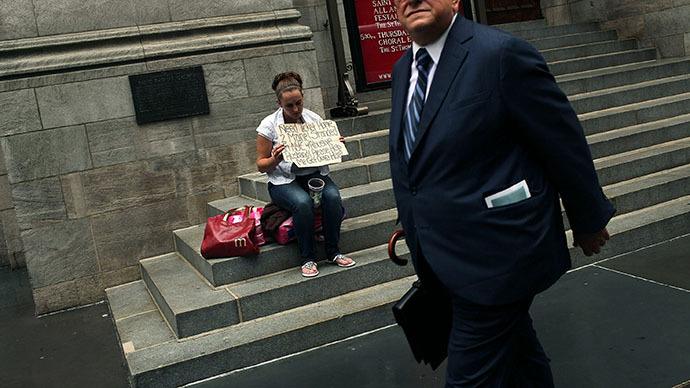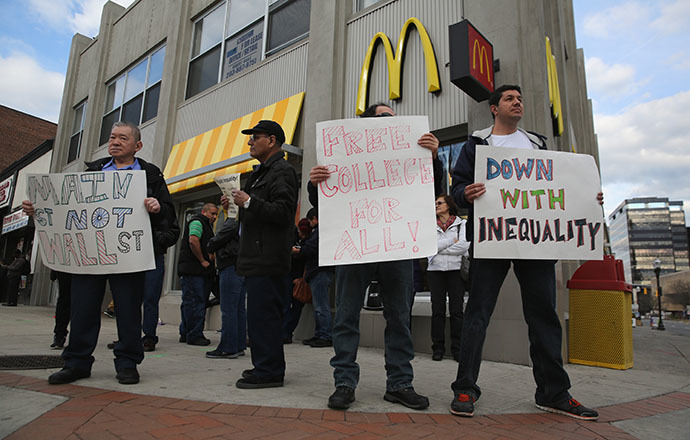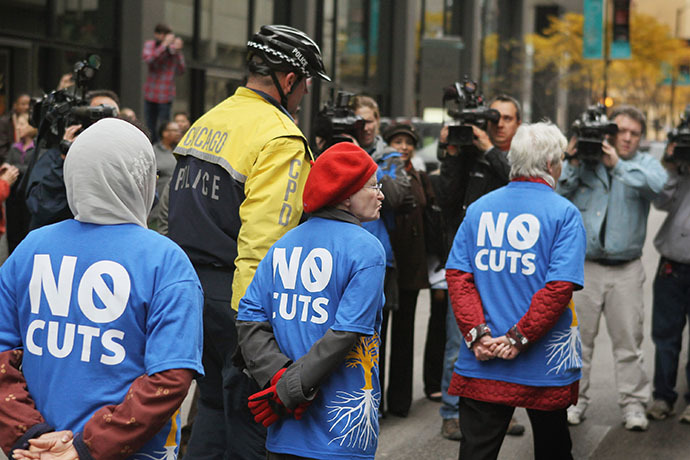Amending constitution to better serve the rich?

There is a growing movement among many conservatives and right wing state legislatures to call a Constitutional Convention to pass a ‘balanced budget amendment’ to the US constitution.
Despite the attempt by many on the right to frame the issue as one of fiscal responsibility, in reality it is merely the latest attack on working people and the poor in the US.
Last month, Michigan’s state senate approved Joint Resolution V, which calls on the US Congress to call a convention in order to draft a new amendment to the constitution requiring the federal government to maintain a balanced budget.
This makes Michigan at least the 20th state to have issued such a call. Constitutional scholars are still hotly debating whether or not the threshold requiring 34 state legislatures to petition the Congress before such a request could be taken up has actually been reached.
Some states have rescinded and/or suspended their petitions, while others have rescinded and then reapplied. Because none of the specifics of this process are enumerated in Article 5 of the constitution, the legal and scholarly territory becomes very murky.
However, the issue is far larger than simply the question of whether or not such a convention should take place. At the root of this debate is the age old class interests of the wealthy – the ‘Lords of Capital’ – on one hand, and working people and the poor on the other. Also, the very fact that a party as thoroughly corrupt and controlled by corporate interests as the Republican Party would be promoting the notion of a Constitutional Convention on a balanced budget amendment, while issues such as permanent war, ubiquitous surveillance, and a fundamentally corrupt financial system are conveniently ignored, should give everyone pause.
The inescapable fact is that, rather than the smokescreen of ‘fiscal responsibility’ that right wing politicians use to sell their utterly moribund ideology, such an amendment is fundamentally an attack on workers and the poor, a means of codifying in the supreme law of the United States the right of the wealthy to exploit and oppress the rest.

The balanced budget swindle
The entire premise of the state legislatures’ appeal to Washington to hold a constitutional convention is for the purposes of passing a so-called ‘Balanced Budget Amendment’. Among the key elements of such an amendment would be the basic requirement that the government could never spend more in a given year than it generates in revenue that same year. In other words, such an amendment would drastically reduce the government’s flexibility in paying its bills, including the much-needed benefits that most Americans receive.
Buried within the rhetoric of right wing talking points is the fact that such an amendment would be a huge step towards expanding the gap between the wealthy and the poor. Hidden beneath layers of distortions and half-truths is the fact that ‘balancing the budget’ and ‘fiscal responsibility’ are merely code words for austerity, American-style.
The non-partisan Center on Budget and Policy Priorities issued a report in 2011 highlighting many, not all, of the reasons why a ‘Balanced Budget Amendment’ would be unproductive and, in fact, would have significant negative impacts on the economy. The authors of the report noted that:
“By requiring a balanced budget every year, no matter the state of the economy, such an amendment would raise serious risks of tipping weak economies into recession and making recessions longer and deeper, causing very large job losses. [It] would force policymakers to cut spending, raise taxes, or both just when the economy is weak or already in recession…When the economy slows, federal revenues decline or grow more slowly and spending on unemployment insurance and other social programs increases, causing deficits to rise. [The amendment would not] allow the ‘automatic stabilizers’ of lower tax collections and higher unemployment and other benefits to cushion a weak economy… [It] would launch a vicious spiral of bad economic and fiscal policy: a weak economy would lead to higher deficits, which would force policymakers to cut spending or raise taxes more, which would weaken the economy further.”
Essentially then, the proposed amendment would create a negative, self-reinforcing cycle of economic hardship wherein elected officials, in collaboration with financial elites, would systematically gouge the social programs and benefits that the majority of Americans depend on. Furthermore, it would hamstring the government’s ability to fight economic depression by forcing all action to be of the spending cut and/or tax raising variety. But of course, the wealthy who are sponsoring this movement would never allow for rises in taxes, so naturally, the entire burden of the depression would be shifted to working people, and the poor.
Social security, long a target of the most reactionary conservatives, would be mortally undercut and wounded by such an amendment. As the report notes, “The balanced budget amendment would raise other problems…due to its requirement that federal spending in any year must be offset by revenues collected in that same year. Social security could not draw down its reserves from previous years to pay benefits in a later year but, instead, could be forced to cut benefits even if it had ample balances in its trust funds, as it does today.”
So, despite the high minded rhetoric of right wing politicians, the amendment is a declaration of war on Social Security, as well as a number of other vital government programs such as FDIC, Medicare, and many others.

Naturally, one would ask whether the richest Americans would need to pay more of their fair share in taxes if the rest of America is being attacked in this way. Of course not, for the reactionary politicians and their corporate sponsors backing this movement have already put forward versions of the amendment and related legislation that would also make it nearly impossible to raise taxes. A version of the amendment that reached the floor of the House of Representatives in 2011 would have required a two thirds supermajority in both chambers of congress in order to effect any raising of taxes.
While it may seem desirable superficially, the deleterious effect this would have on the national economy and social programs would be staggering. Without the ability to raise taxes, there would be no way to ensure the solvency of social security and Medicare, two programs paid into by every working American. If, for instance, the payroll tax would need to be increased, or the cap removed, it would require a supermajority which, in nearly every case, would be politically unfeasible.
And so, by enacting such an amendment, the social programs working Americans have paid into would continue to be plundered, stripped, and undercut, while the wealth of the richest class of Americans is nearly untouched.
In addition, the proposed amendment would be part of a comprehensive strategy to preserve those aspects of the US economy that benefit the wealthy few. For instance, the infamous tax credits, loopholes and other government subsidies which disproportionately favor the wealthy would be preserved. In fact, the amendment would shift even more the burden of paying for economic depressions, recessions, and downturns onto the backs of working people.
Corporations would undoubtedly benefit tremendously both in terms of tax credits, but also increased business where the federal government can no longer afford to take on large scale projects and other expenditures.
‘Blame the victim’
The reality is that right wing reactionaries are using the momentum of the Tea Party to ram through regressive policies which have nothing to do with ‘reining in spending’, and everything to do with gouging the American worker. At a time of declining standards of living, declining real wages and median income, increased homelessness and chronic unemployment and underemployment, when young people are saddled with debts they can never repay and healthcare continues to be a profit-driven product of a corporate system, when millions have been kicked out of their homes through foreclosures (many of which are utterly illegal) – at this moment in history, a right wing movement develops to cut spending and ‘balance budgets’?

The United States is unquestionably in decline. Real economic indicators bear this out, as does even a cursory analysis of the political, economic, social, and cultural decay of American society. As all national institutions continue to erode and morph into the corrupt and moribund playthings of billionaires and their political sock puppets, we are supposed to be energized by a bunch of conservatives who want to blame working people and the poor for the economic problems afflicting the country? It is the standard ‘blame the victim’ mentality.
However, it also signals a deeper psychosis within the US, one that cannot be treated with the panacea of ‘prosperity’ and ‘growth’. This psychosis is the collective self-deception that ‘things will get better’, that the system can be fixed with a few tweaks and reforms. Only such crude thinking could possibly justify the idea that a Constitutional Convention to pass a ‘Balanced Budget Amendment’ could be a good thing.
The constitution, that founding document that now only theoretically governs the actions of the government and our elected officials, could use some changes. Perhaps it’s time to enshrine our economic rights within the constitution: the right to a home, a job, healthcare, clean drinking water, sufficient food, education, retirement, and other social benefits. This would be fodder for a Constitutional Convention.
It’s time to have an amendment that explicitly defines ‘military force’ and codifies what qualifies as such, and restrains the right of the government to wage endless war. It’s time to have an amendment that guarantees the rights of individual citizens to be free of mass surveillance, enshrining the right to privacy.
In the midst of all these crises in this country, a group of corporate bureaucrats in the employ of the financial ruling class want to pass a ‘Balanced Budget Amendment’? It would be laughable, if it weren’t so downright tragic.
The statements, views and opinions expressed in this column are solely those of the author and do not necessarily represent those of RT.
The statements, views and opinions expressed in this column are solely those of the author and do not necessarily represent those of RT.













